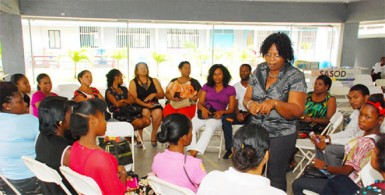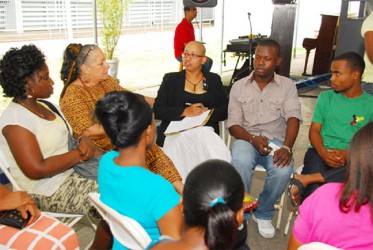Participants at a joint forum on the Use of Sexual Violence in Gross Human Rights Violations said that steps must be taken to address the rape culture in Guyana.
They also said that police and other services providers must be educated on the laws regarding sexual offences and provided with sensitivity training to respond to survivors of sexual assault, particularly among vulnerable groups.
The forum was organized by SASOD, Red Thread, Help and Shelter and the Colwyn Harding Support Group on Sunday to commemorate the International Day for the Right to Truth Concerning Gross Human Rights Violations and for the Dignity of Victims. It aimed to raise awareness about the scourge of sexual violence affecting society; to acknowledge that victims of this type of crime rarely receive justice and to develop a plan of action on how this issue can be addressed collectively within local communities.

The International Day for the Right to Truth Concerning Gross Human Rights Violations is observed on March 24 annually, a press release said. After the presentations, participants were put into small working groups to discuss key issues in addressing sexual violence in communities, in institutional settings and the justice system and to make recommendations.
In her address, Danuta Radzik, of Help and Shelter, spoke extensively on the rape culture in Guyana which she asserted is fuelled and sustained by rape myths, stereotypes, traditional and fixed beliefs about gender and gender roles, homophobia and false notions of masculinity and sexism. She also gave an overview of the Sexual Offences Act 2010 which is said to be one of the most progressive laws on sexual offences in the Caribbean.
Radzik also pointed out that implementation of this law has proven to be a challenge. The law is not widely known by the citizenry and as a result prosecution remains low. One of the major challenges is recognizing that men are also raped. While the law recognizes this, male victims of sexual violence are too often dehumanized and further victimized if they report the crime. Rape is also used as a form of torture against men, as is the case in the Colwyn Harding incident.
Presenters Wintress White of Red Thread and Zenita Nicholson of SASOD both said that survivors of rape often suffer a systemic violation of their rights when the authorities fail to act or are slow to act when a rape is reported by specific vulnerable groups within the population.

White recalled a case when a sex worker attempted to report that she had been raped and was chased away by police who told her that “sex workers do not get raped.” Reiterating that rape myths need to be debunked, White said police must be informed about the Sexual Offences Act and trained to handle rape complaints.
Moreover, Nicholson said that how police handle reports of rape by lesbians, gays, bisexual and transgender (LGBT) persons “is where we see the most overt violations of human rights.” She noted that a vast majority of sexual abuse incidents go unreported by LGBT persons because they are further victimized by police and healthcare providers and as such these victims do not believe that they have any real form of redress.
At the close of the working group sessions, the forum found that addressing the development of a rape culture in Guyana where victims are blamed and the incident trivialized is vital to change. Participants also noted that the populace is not educated on the laws and as a result do not know how to seek justice.
Police and service providers must also be educated on the laws regarding sexual offences, in addition to being given sensitivity training to respond to survivors of sex crimes. Of concern too is the fact that the Sexual Offences Act does not adequately cover sexual harassment in the workplace or in institutional settings; leaving victims of sexual assault in the workplace without recourse. Participants also voiced concerns about the normalizing of violent sexual acts by promoting sexually explicit music lyrics and videos.
At the close of the forum a donation was collected to support the efforts of the Colywn Harding Support Group to seek justice and proper medical care for Harding. He has accused the police of rape.




